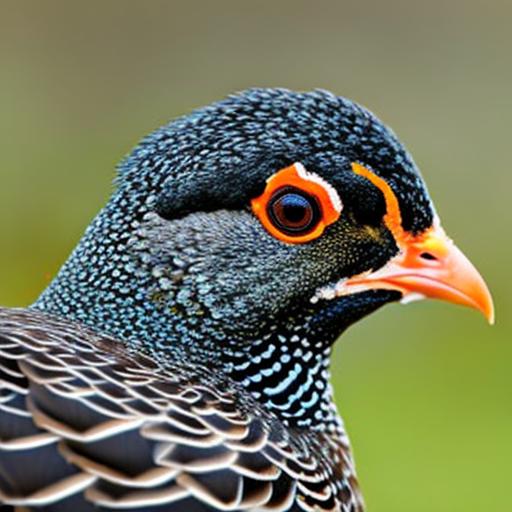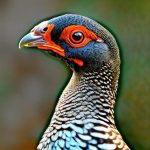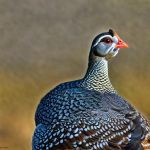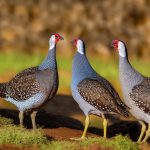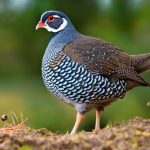Guinea fowl, also known as pintades, are a unique and fascinating addition to any farm or homestead. These birds are native to Africa but have been domesticated and are now commonly raised for their meat, eggs, and pest control abilities. Guinea fowl are known for their striking appearance, with speckled feathers and a distinctive helmet-like crest on their heads. They are also highly social birds, often forming close-knit flocks and displaying complex social behaviors.
Guinea fowl are excellent foragers and can help control insect populations on a property, making them a valuable addition to any farm or garden. They are also relatively low-maintenance birds, requiring minimal care compared to other poultry species. However, they do have specific needs when it comes to housing, nutrition, and healthcare. In this article, we will explore the various aspects of raising guinea fowl, including creating a safe and secure enclosure, providing proper nutrition and water, protecting against predators, ensuring proper health and veterinary care, creating a comfortable and stimulating environment, and training and socializing guinea fowl.
Key Takeaways
- Guinea fowl are hardy and low-maintenance birds that are great for pest control and as pets.
- A safe and secure enclosure is essential for protecting guinea fowl from predators and providing them with a comfortable living space.
- Guinea fowl require a balanced diet of high-quality feed, fresh water, and access to foraging opportunities.
- Protecting guinea fowl from predators such as foxes, raccoons, and birds of prey is crucial for their safety and well-being.
- Regular health check-ups and access to veterinary care are important for ensuring the well-being of guinea fowl.
Creating a Safe and Secure Enclosure
When it comes to housing guinea fowl, it’s important to provide them with a safe and secure enclosure that meets their specific needs. Guinea fowl are highly active birds and require plenty of space to roam and forage. A spacious outdoor enclosure with access to grass, shrubs, and insects is ideal for guinea fowl. The enclosure should be securely fenced to prevent predators from gaining access and should also have a covered area for protection from the elements.
In addition to a secure outdoor enclosure, guinea fowl also require a sheltered area for roosting and nesting. This can be a simple structure such as a coop or shelter with roosting bars and nesting boxes. The shelter should be well-ventilated and provide protection from extreme temperatures. It’s important to regularly clean and maintain the enclosure to ensure the health and well-being of the guinea fowl. Providing ample space, protection from predators, and a comfortable shelter are essential for creating a safe and secure environment for guinea fowl.
Providing Proper Nutrition and Water
Proper nutrition is essential for the health and well-being of guinea fowl. These birds are omnivorous and have a varied diet that includes seeds, grains, insects, and vegetation. In addition to foraging for food in their outdoor enclosure, guinea fowl should be provided with a balanced commercial poultry feed to ensure they are getting all the necessary nutrients. It’s important to choose a high-quality feed specifically formulated for guinea fowl to meet their unique dietary requirements.
In addition to a balanced diet, guinea fowl also require access to clean, fresh water at all times. Water is essential for digestion, temperature regulation, and overall health. It’s important to provide water in a shallow dish or container that is easily accessible to the guinea fowl. During hot weather, it’s especially important to monitor water consumption and ensure that the birds have an adequate supply of water to prevent dehydration.
In addition to commercial feed and water, guinea fowl can also benefit from supplemental treats such as mealworms, fruits, and vegetables. These treats can be used as a form of enrichment and can help keep the birds stimulated and healthy. Providing proper nutrition and access to clean water is essential for the overall health and well-being of guinea fowl.
Protecting Against Predators
Predator protection is a crucial aspect of raising guinea fowl, as these birds are vulnerable to a wide range of predators including foxes, raccoons, hawks, and even domestic dogs. It’s important to take proactive measures to protect guinea fowl from potential threats. This can include installing secure fencing around the outdoor enclosure, using predator-proof locks on coop doors, and adding deterrents such as motion-activated lights or sound devices.
In addition to physical barriers, it’s important to be vigilant and observant when it comes to predator protection. Regularly inspect the enclosure for signs of damage or potential entry points for predators. It’s also important to be mindful of the surrounding environment and take steps to minimize attractants such as food scraps or standing water that could draw in predators.
Another effective way to protect guinea fowl from predators is by providing them with a safe place to roost at night. Guinea fowl naturally roost in trees or elevated structures, so providing them with secure roosting options can help keep them safe from ground-dwelling predators. By taking proactive measures and being vigilant about predator protection, you can help ensure the safety and security of your guinea fowl.
Ensuring Proper Health and Veterinary Care
Ensuring the proper health and veterinary care of guinea fowl is essential for their overall well-being. Regular health checks are important for monitoring the condition of the birds and identifying any potential issues early on. It’s important to observe the behavior and appearance of the guinea fowl on a daily basis to look for signs of illness or injury.
In addition to regular observation, it’s important to provide preventative healthcare for guinea fowl. This can include vaccinations, parasite control, and regular deworming treatments. It’s also important to provide a clean and sanitary environment for the birds to minimize the risk of disease transmission.
In the event that a guinea fowl does become ill or injured, it’s important to seek veterinary care from a professional with experience in avian medicine. A veterinarian can provide an accurate diagnosis and recommend appropriate treatment options to help the bird recover.
By prioritizing proper health care and veterinary attention, you can help ensure that your guinea fowl remain healthy and thriving.
Creating a Comfortable and Stimulating Environment
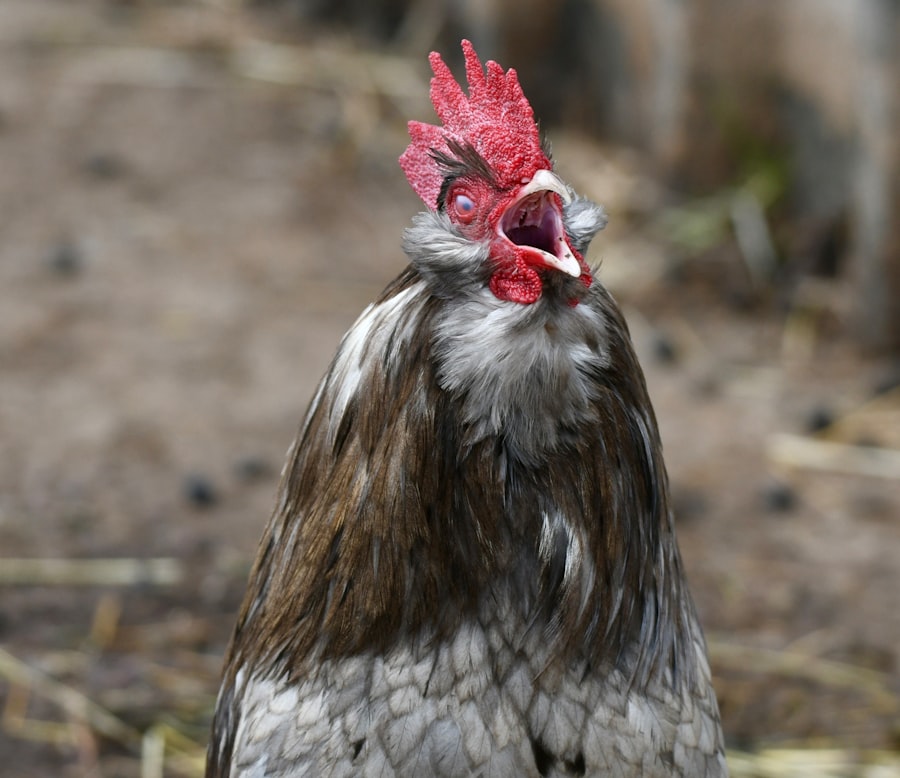
Creating a comfortable and stimulating environment is important for the overall well-being of guinea fowl. These birds are highly social and active, so it’s important to provide them with plenty of space to roam and explore. A spacious outdoor enclosure with access to grass, shrubs, and insects can provide ample opportunities for foraging and enrichment.
In addition to outdoor space, it’s important to provide guinea fowl with a sheltered area for roosting and nesting. This can be a simple structure such as a coop or shelter with roosting bars and nesting boxes. The shelter should be well-ventilated and provide protection from extreme temperatures.
Enrichment activities can also help keep guinea fowl stimulated and engaged. This can include providing them with access to natural materials such as branches or logs for perching, as well as offering them supplemental treats such as mealworms or fruits and vegetables.
By creating a comfortable and stimulating environment, you can help ensure that your guinea fowl remain healthy, happy, and thriving.
Training and Socializing Guinea Fowl
Training and socializing guinea fowl is an important aspect of raising these birds. Guinea fowl are highly social animals that thrive in close-knit flocks, so it’s important to provide them with opportunities for social interaction. This can include raising them in groups from a young age and providing them with plenty of space to roam and interact with one another.
In addition to socialization, training can also help guinea fowl become more comfortable around humans and more manageable in a domestic setting. Positive reinforcement training techniques can be used to teach guinea fowl basic commands or behaviors such as coming when called or perching on command.
It’s important to be patient and consistent when training guinea fowl, as these birds can be independent-minded and may take time to adjust to new routines or expectations. By providing opportunities for socialization and training, you can help ensure that your guinea fowl are well-adjusted and comfortable in their environment.
In conclusion, raising guinea fowl can be a rewarding experience that offers numerous benefits including pest control, meat production, egg production, and companionship. By providing a safe and secure enclosure, proper nutrition and water, protection against predators, proper health care, a comfortable environment, and opportunities for socialization and training, you can help ensure that your guinea fowl thrive in your care. With proper attention to their specific needs, guinea fowl can make a valuable addition to any farm or homestead.
If you’re looking for tips on how to keep guinea fowl at home, you may also be interested in learning how to insulate a chicken coop. Insulating your coop can help provide a comfortable environment for your guinea fowl and other poultry, especially during colder months. Check out this helpful article on how to insulate a chicken coop for valuable insights and practical advice.
FAQs
What are guinea fowl?
Guinea fowl are a type of bird native to Africa. They are known for their distinctive spotted feathers and loud, chattering calls.
Why would I want to keep guinea fowl at home?
Guinea fowl are often kept for their pest control abilities, as they are known to eat insects, ticks, and other pests. They can also be kept for their meat and eggs.
How can I keep guinea fowl at home?
To keep guinea fowl at home, you will need a secure enclosure to protect them from predators. Guinea fowl are known to roost in trees, so providing them with a safe place to roost is important. Additionally, they will need access to fresh water and a balanced diet.
What do guinea fowl eat?
Guinea fowl are omnivores and will eat a variety of foods, including insects, seeds, grains, and vegetation. It’s important to provide them with a balanced diet to keep them healthy.
Are guinea fowl noisy?
Yes, guinea fowl are known for their loud calls and can be quite noisy, especially when they feel threatened or are trying to communicate with each other.
Can guinea fowl fly?
Yes, guinea fowl are capable of flying short distances and are known to roost in trees. However, they are not strong fliers and are generally considered to be ground-dwelling birds.
Meet Walter, the feathered-friend fanatic of Florida! Nestled in the sunshine state, Walter struts through life with his feathered companions, clucking his way to happiness. With a coop that’s fancier than a five-star hotel, he’s the Don Juan of the chicken world. When he’s not teaching his hens to do the cha-cha, you’ll find him in a heated debate with his prized rooster, Sir Clucks-a-Lot. Walter’s poultry passion is no yolk; he’s the sunny-side-up guy you never knew you needed in your flock of friends!

